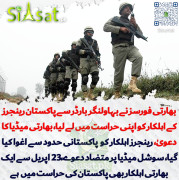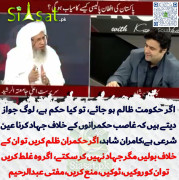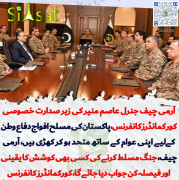Dr ali ahmad
Voter (50+ posts)
Pakistan Prime Minister Nawaz Sharif in his recent meeting with Saudi Arabias Deputy Crown Prince and Defence Minister Muhammad Bin Salman assured him of Pakistan's support if any threat arises to Saudi Arabia's territorial integrity.
According to a statement released from Prime Minister House, the prime minister welcomed the Saudi initiative to establish a coalition to counter terrorism and militancy and informed the deputy crown prince that Pakistan supports all efforts to counter terrorism and extremism.
Saudi Arabia has formed a coalition of 34 mainly Muslim countries - including powers such as Egypt and Turkey - to coordinate a fight against "terrorist organisations".
The alliance includes Jordan, Bahrain, Turkey and the United Arab Emirates, which are conducting airstrikes in Syria as part of a U.S.-led coalition against Islamic State. Others from the Middle East include Tunisia, Lebanon, Libya and Egypt. Pakistan, Bangladesh and Malaysia are also part of the effort, as are a number of African countries such as Sudan, Somalia, Mali and Nigeria.
The coalition is scheduled to aim at pushing back and confronting the terrorists and those who promote their violent ideologies. The alliance is thought would work to target "any terrorist organisation, not just ISIL" in countries including Iraq, Syria, Libya, Egypt, and Afghanistan.
The opposing camp is led by Russia.The de facto Moscow-Beijing-Tehran alignment -a new geostrategic axis- is based on the common goals of promoting economic self-interest and reducing U.S. influence. Certainly this opponent triangle has been built on the foundations of fairly recent but significant bilateral ties between the two countries and Tehran.Moscow's ties with the Iranian regime "reflect a geopolitical agenda which is at least twenty years old." Russia is engaged in what might be called "strategic opportunism". Similarly, one can trace Beijing's increasing links with Tehran to the first years of the Iran-Iraq war in the early 1980s.For its part, Iran has followed a consistent anti-America and anti-Israel path since its 1979 revolution.
The question arises: should Pakistan join any of these two camps which are at daggers drawn over the issue of Syria?
Islamabad and Riyadh have long been intimate friends and military partners, but Pakistan can ill afford to anger the triangle of Iran, Russia and China.
Keeping in view the current domestic scenario and international state of affairs, Pakistan should remain neutral because joining the proxy war is likely to have both short-and long -term drastic implications for Pakistan.
On domestic front, joining the alliance may trigger sectarian war. It may spark Sunni-Shia conflict in Pakistan. At a time when internal issues are causing irreparable damage to Pakistan, the decision to join an anti-Iran alliance with Saudi Arabia is futile, as it will antagonize Iran, fuel sectarian conflict at home, and distract a military fighting a war on its western front.
Sharif's moral support for the Saudi's is obvious. And he has tilted his country towards the regional Saudi -led Sunnis bloc. But the cost for direct involvement seems to be far greater for Pakistan than for any other coalition member. Pakistan shares a 656- mile -long border with Iran and relations between the two countries have long been rocky. If Iran starts to view Pakistan as an active adversary, it has many opportunities to cause trouble across the border.
Pakistan's border with Iran will become highly permeable and volatile. As a consequence, Pakistan,especially Balochistan will suffer from high instability. In addition, Pak-China Economic Corridor (PCEC) and numerous deals with Russia will get cancelled, which is what India wants to see.
It is known that Russia has recently warned Pakistan not to join the Saudi-led coalition because this would have terrible implications for Pakistan.
The sad fact is that this important issue of joining the alliance was not considered to be of such importance to be discussed in the parliament. Pakistan must stay neutral at this important point of time in order to avoid terrible consequences, both at domestic and international fora.
The reason for such immature decisions is lack of any cogent foreign policy. Pakistan has never been serious in promoting institutions of diplomatic affairs. Pakistan Foreign policy lacks sagacity which does not define any principled stance for the interest of the nation.
.....................................
Dr Ali Ahmad
10 January 2016
According to a statement released from Prime Minister House, the prime minister welcomed the Saudi initiative to establish a coalition to counter terrorism and militancy and informed the deputy crown prince that Pakistan supports all efforts to counter terrorism and extremism.
Saudi Arabia has formed a coalition of 34 mainly Muslim countries - including powers such as Egypt and Turkey - to coordinate a fight against "terrorist organisations".
The alliance includes Jordan, Bahrain, Turkey and the United Arab Emirates, which are conducting airstrikes in Syria as part of a U.S.-led coalition against Islamic State. Others from the Middle East include Tunisia, Lebanon, Libya and Egypt. Pakistan, Bangladesh and Malaysia are also part of the effort, as are a number of African countries such as Sudan, Somalia, Mali and Nigeria.
The coalition is scheduled to aim at pushing back and confronting the terrorists and those who promote their violent ideologies. The alliance is thought would work to target "any terrorist organisation, not just ISIL" in countries including Iraq, Syria, Libya, Egypt, and Afghanistan.
The opposing camp is led by Russia.The de facto Moscow-Beijing-Tehran alignment -a new geostrategic axis- is based on the common goals of promoting economic self-interest and reducing U.S. influence. Certainly this opponent triangle has been built on the foundations of fairly recent but significant bilateral ties between the two countries and Tehran.Moscow's ties with the Iranian regime "reflect a geopolitical agenda which is at least twenty years old." Russia is engaged in what might be called "strategic opportunism". Similarly, one can trace Beijing's increasing links with Tehran to the first years of the Iran-Iraq war in the early 1980s.For its part, Iran has followed a consistent anti-America and anti-Israel path since its 1979 revolution.
The question arises: should Pakistan join any of these two camps which are at daggers drawn over the issue of Syria?
Islamabad and Riyadh have long been intimate friends and military partners, but Pakistan can ill afford to anger the triangle of Iran, Russia and China.
Keeping in view the current domestic scenario and international state of affairs, Pakistan should remain neutral because joining the proxy war is likely to have both short-and long -term drastic implications for Pakistan.
On domestic front, joining the alliance may trigger sectarian war. It may spark Sunni-Shia conflict in Pakistan. At a time when internal issues are causing irreparable damage to Pakistan, the decision to join an anti-Iran alliance with Saudi Arabia is futile, as it will antagonize Iran, fuel sectarian conflict at home, and distract a military fighting a war on its western front.
Sharif's moral support for the Saudi's is obvious. And he has tilted his country towards the regional Saudi -led Sunnis bloc. But the cost for direct involvement seems to be far greater for Pakistan than for any other coalition member. Pakistan shares a 656- mile -long border with Iran and relations between the two countries have long been rocky. If Iran starts to view Pakistan as an active adversary, it has many opportunities to cause trouble across the border.
Pakistan's border with Iran will become highly permeable and volatile. As a consequence, Pakistan,especially Balochistan will suffer from high instability. In addition, Pak-China Economic Corridor (PCEC) and numerous deals with Russia will get cancelled, which is what India wants to see.
It is known that Russia has recently warned Pakistan not to join the Saudi-led coalition because this would have terrible implications for Pakistan.
The sad fact is that this important issue of joining the alliance was not considered to be of such importance to be discussed in the parliament. Pakistan must stay neutral at this important point of time in order to avoid terrible consequences, both at domestic and international fora.
The reason for such immature decisions is lack of any cogent foreign policy. Pakistan has never been serious in promoting institutions of diplomatic affairs. Pakistan Foreign policy lacks sagacity which does not define any principled stance for the interest of the nation.
.....................................
Dr Ali Ahmad
10 January 2016
- Featured Thumbs
- http://astrobob.areavoices.com/astrobob/images/Flags_panel_1.jpg
Last edited:































